The phrase “GCSE reform” crops up every year around results day, but over the next few years it will have real substance. Here we covered the proposed changes to GCSE exams in England, from the continued use of formula and equation sheets to the rollout of digital assessments and a much broader curriculum review. It also tackles common questions such as “Is a GCSE resit mandatory?” and looks at alternatives being discussed, like replacing GCSEs entirely.
GCSEs have existed since 1986, when they replaced the two‑tier systems of O‑levels and CSEs. They were designed to provide a single, more inclusive qualification for 16‑year‑olds leaving school. Since then, they have been revised several times, most notably under reforms introduced by Michael Gove in the 2010s that made courses linear, removed most coursework and modular exams, and introduced a 9–1 grading scale. Those reforms were intended to raise standards and align England’s exams with the most rigorous in the world.
However, the world has not stood still. Young people must now remain in education or training until 18, not 16, and the curriculum must prepare students for a future that will be shaped by artificial intelligence, global competition and environmental challenges. At the same time, the lingering impacts of the COVID‑19 pandemic have exposed inequalities and prompted temporary concessions that may now become permanent. Add to this a growing chorus of critics who argue that high‑stakes exams harm mental health and fail to promote real learning, and it is clear why policy‑makers are re-examining the GCSE landscape.
Why Trust RS Remote Tutoring?
This article takes you through the key elements of the latest GCSE reforms, the debate around them and the practical implications for students and parents. We go beyond headline announcements to explain how assessments might change and what’s likely to stay the same, all while keeping an eye on your frequently asked questions. Throughout, you will find suggestions on how to adapt study strategies and where to find support, including the role of online tutoring.
Jump to Section
Why Are GCSEs Being Reformed?
Calls for change
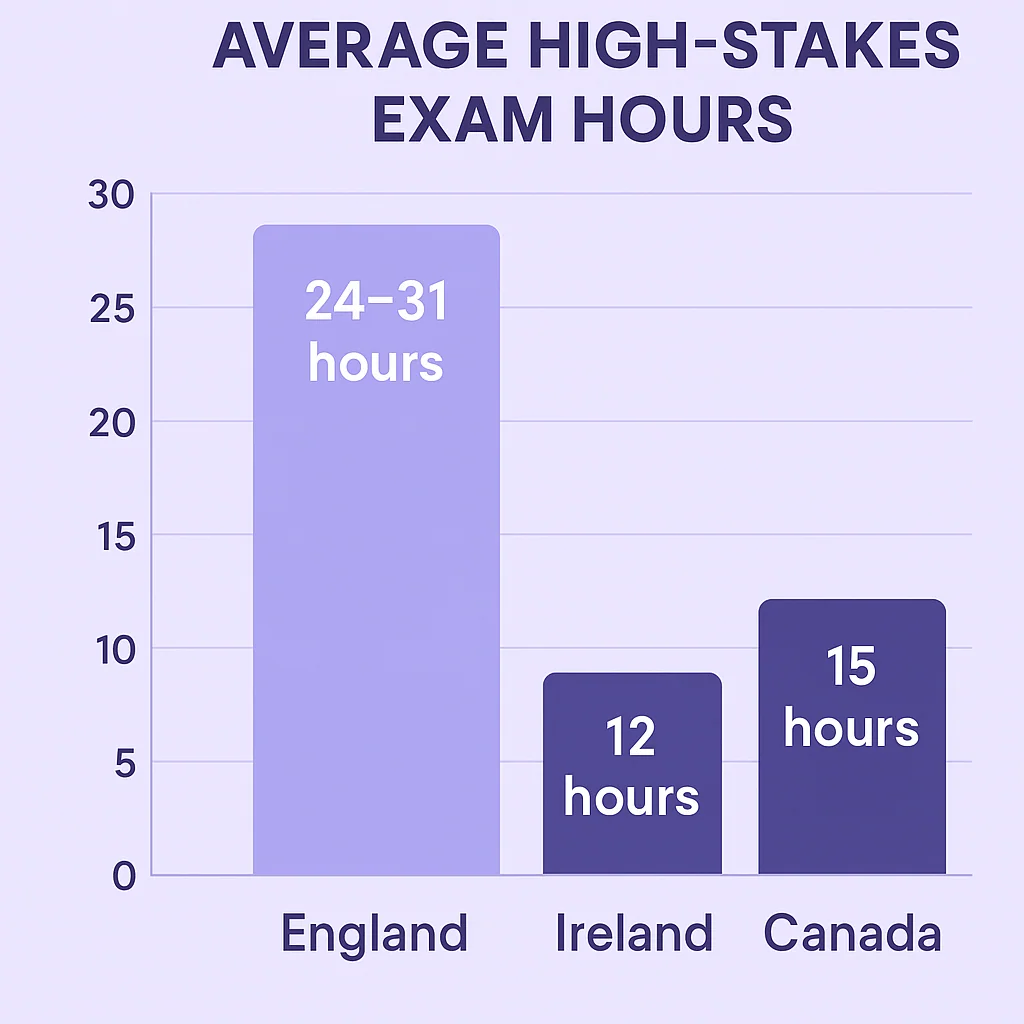
Many educationalists, parents and employers believe that the current GCSE system is no longer fit for purpose. Key complaints include:
- Outdated assumptions about school‑leavers. When GCSEs were introduced, most young people left school at 16. Today, they must stay in education or training until 18, making a school‑leaving qualification at 16 seem less essential.
- Excessive exam hours. A typical Year 11 student sits between 24 and 31 hours of high‑stakes exams, roughly twice as many as in comparable countries like Ireland or Canada. Critics say this encourages rote memorisation over deep learning and leaves little time for extracurricular activities.
- Overloaded syllabuses and teaching to the test. Reforms in the last decade made GCSEs more content‑heavy. Teachers report struggling to cover the material, and students often learn facts for short‑term recall rather than understanding.
Stress and wellbeing. Exam anxiety and mental‑health concerns among teenagers have risen sharply. Support services say the pressures of revision and exam results can lead to sleep problems, depression and disengagement. - Persistent achievement gaps. Roughly a third of candidates finish Year 11 without achieving the grade 4 ‘standard pass’ in English and maths. Pupils from disadvantaged backgrounds are over‑represented in this group. The mandatory resit policy for those subjects is meant to address this, but many see it as a punitive measure rather than a supportive one.
- Socio‑economic inequality. Families who can afford private tutoring and resources often gain an advantage, creating a two‑tier system and fuelling calls for more equitable, holistic assessment.
There are also broader concerns that GCSEs prioritise academic knowledge over practical and vocational skills demanded by employers. In fast‑evolving industries such as digital technology, engineering and healthcare, future success may depend more on adaptability, problem‑solving and collaboration than on an ability to recall facts under timed conditions.
Existing reforms
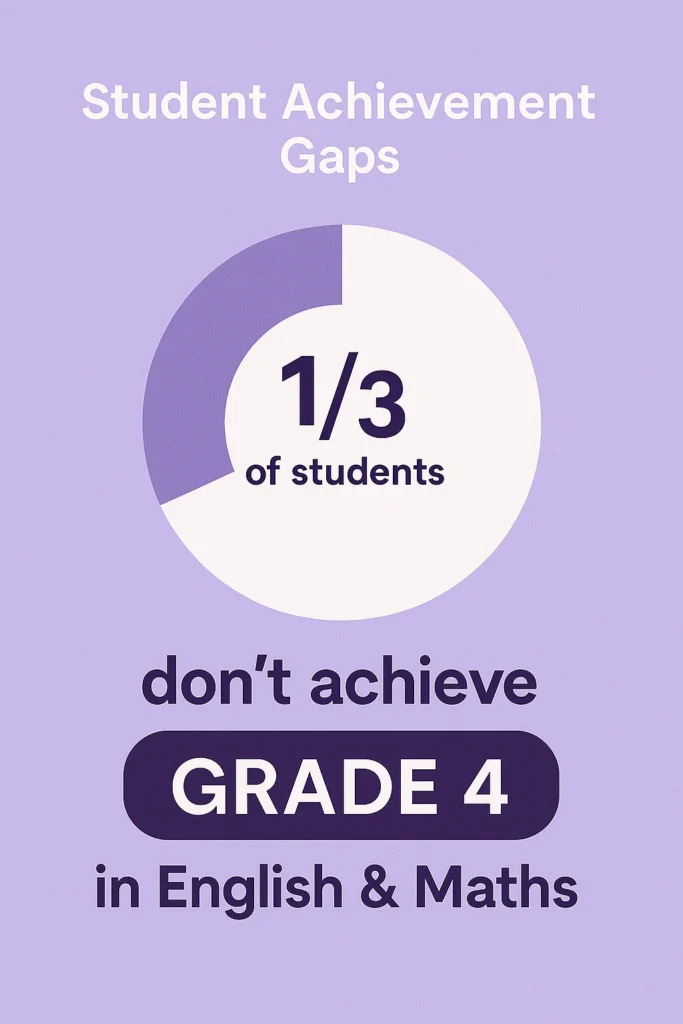
Before exploring the proposed changes ahead, it is important to understand what has already changed. The previous round of GCSE reforms, completed in 2017–2019, introduced several significant adjustments:
- Linear structure. GCSEs shifted from modular courses, where students could sit units and resit them over time, to a linear two‑year programme culminating in final exams. This means you must perform at your best at the end of Year 11.
- Reduced coursework. Many subjects removed or drastically reduced their controlled assessments. Coursework now plays a smaller role and is tightly controlled to reduce opportunities for malpractice.
- Foundation and higher tiers. Some subjects (notably maths, science and languages) retained tiered papers. Foundation tier targets grades 1–5 and Higher tier targets 4–9, though a grade 3 on a higher tier paper is unclassified. Schools must decide which tier suits each student.
- 9–1 grading. The traditional A-G* scale has been replaced by 9–1, with 9 being the highest grade. Grade 4 is considered a standard pass (roughly equivalent to a low C), while grade 5 is a strong pass (mid‑to‑high C). This allows more differentiation among higher‑achieving students.
- National exam series. All GCSE exams in England and Wales take place in the summer, usually from May to June. There is an additional resit opportunity for English and maths each November. In Wales and Northern Ireland, some subjects still use the A*–G scale and have slightly different schedules.
These reforms were intended to raise standards and bring England’s qualifications closer to those in high‑performing education systems. However, they also increased the stakes and the complexity of GCSEs. The next phase of reform seeks to address those unintended consequences.
Pandemic‑Era Concessions: Formula and Equation Sheets Extended
Why formula sheets were introduced
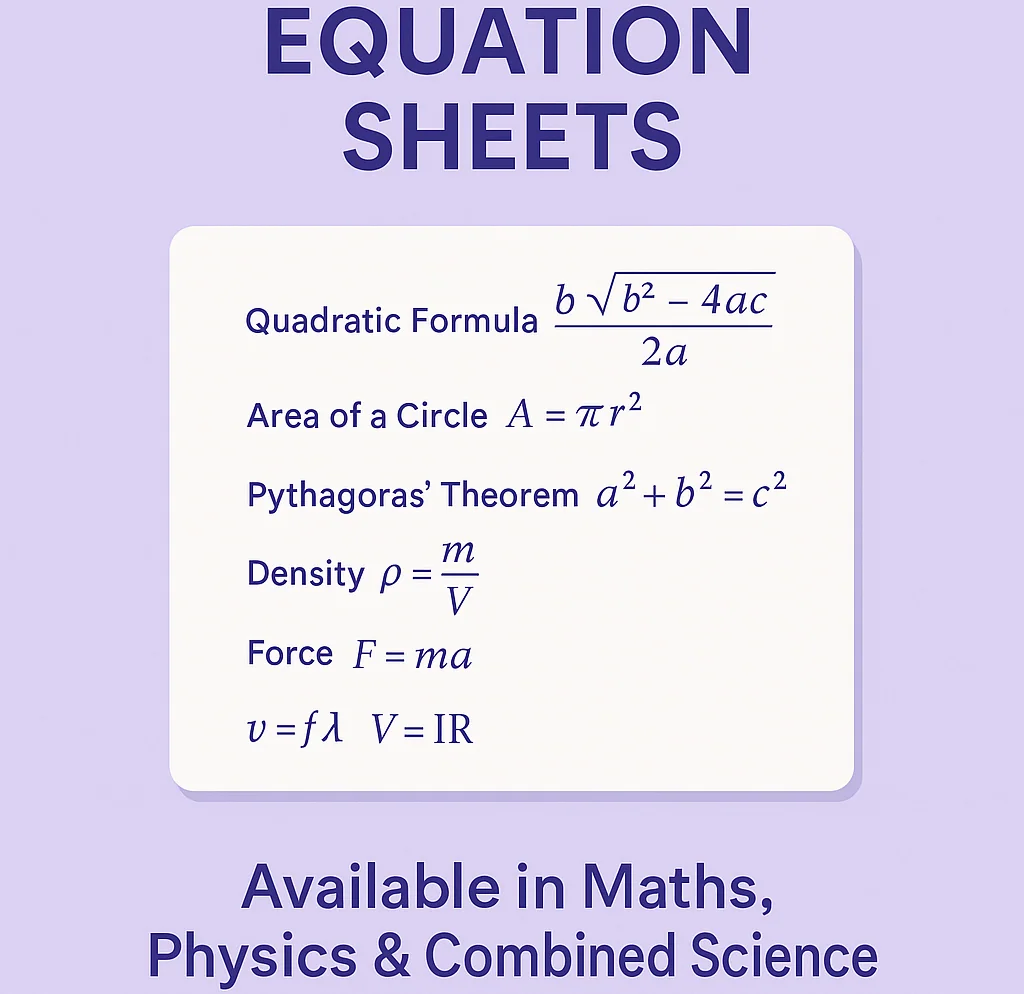
During the 2020 and 2021 academic years, schools closed for long periods due to the COVID‑19 pandemic, and students faced significant learning loss. To compensate, the Department for Education (DfE) introduced formulae sheets for GCSE mathematics and equation sheets for physics and combined science. These sheets listed all the formulas students might need, reducing the memory burden at a time when many had missed lessons.
Extension through 2027
As exams returned to normal, teachers and parents wondered whether these sheets would disappear. In late 2023, Education Secretary Bridget Phillipson asked the exam regulator Ofqual to extend the concession. Ofqual’s subsequent consultation concluded that students will not have to memorise formulae in maths or equations in physics and combined science for the 2025, 2026 and 2027 exam seasons.
This applies to all exam boards in England, including AQA, OCR, Edexcel and WJEC/Eduqas. It covers the November series as well as the summer series. Formula/equation sheets will be provided alongside the exam paper. Students will still be expected to know how to apply the formulas; the goal is to support understanding rather than memorisation.
Equality and accessibility considerations
Ofqual’s equality impact assessment found that formula sheets improved access for many students with special educational needs and disabilities (SEND) who may struggle to remember numerous equations. However, some teachers worried that younger or less‑confident pupils might spend time searching the sheet rather than focusing on problem‑solving. Ultimately, the regulator concluded that the benefits outweighed the drawbacks and that schools could mitigate potential confusion with practice and guidance.
Practical tips for students while preparing:
- Practise using the sheets during revision so you know where formulas are located.
- Focus on understanding concepts and identifying which formula is needed for a given problem.
- Don’t neglect memorisation entirely; knowing common formulas (like area and volume) by heart can still save time.
Digital Exams: The Move Onscreen
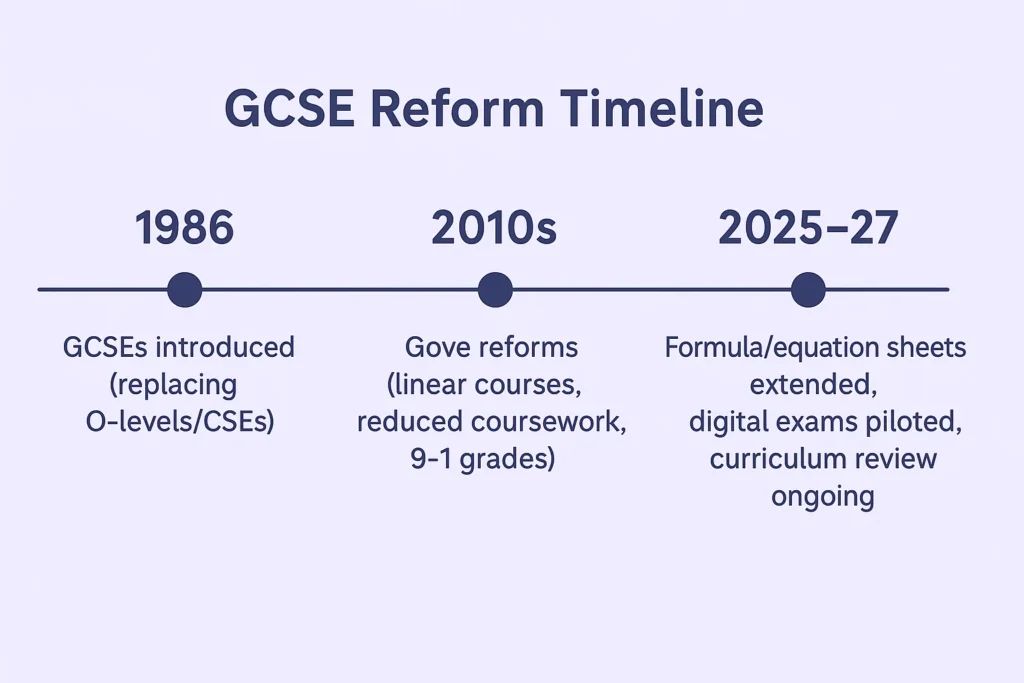
Trials and timelines
Another major change on the horizon is the shift from paper‑based exams to onscreen assessments. Leading exam boards – including Pearson Edexcel, AQA, OCR and WJEC/Eduqas, are developing digital platforms to deliver GCSEs online.
In 2023, Edexcel announced plans to pilot digital papers in English Language and Business Studies. The initial goal was to have at least one subject available digitally by 2025. Delays and practicalities have pushed back the roll‑out, but the board still aims to have history and business studies available digitally by 2027 and to provide most GCSE subjects onscreen by 2030. AQA and OCR are also developing platforms and have trialled digital mocks with selected schools.
How digital exams work
Onscreen exams will contain the same questions as the paper versions. Students log into a secure portal, complete the paper by typing responses or using drawing tools for diagrams, and submit their answers electronically. The system automatically saves progress to prevent lost work due to glitches. Some key features and considerations:
- Accessibility tools. Digital platforms can provide adjustable font sizes, colour filters, text‑to‑speech or voice recognition. These options support students with dyslexia, visual impairments or other SEND needs.
- Navigation and highlighting. Students can flag questions to return to, highlight text on screen and expand reading passages without needing extra paper.
- Reduced logistical costs. Onscreen exams could eventually reduce printing, postage and secure storage costs, and may streamline marking through automated or onscreen annotation.
- Dual format expected. For the foreseeable future, paper exams will run alongside digital ones. Schools will choose the format or offer both to cater to different learners.
- Technical challenges. Schools will need reliable internet, enough devices and technical support. Exam centres must mitigate risks from connectivity issues, cyber security threats and hardware failures.
Preparing for digital assessments
To adapt to onscreen exams, students and teachers should:
- Practise with digital mocks. Many schools now use online platforms for internal assessments; treat these as opportunities to become comfortable with onscreen navigation.
- Use digital note‑taking tools. Apps like OneNote, Google Docs or digital whiteboards mirror features you’ll see on the exam platform.
- Maintain handwriting skills. You may still need to handwrite mathematics working or diagrams on scrap paper, and extended writing on paper remains essential for many subjects and for writing speed and fluency.
National Curriculum and Assessment Review: A Potential Overhaul
In addition to specific changes like formula sheets and digital exams, the Government is conducting a wide‑ranging review of the national curriculum and assessment. This review examines what students should study from early years through post‑16 and how their learning should be assessed. The Education Secretary has described the current system as “outdated and unfit for the digital age”.
Although the review’s recommendations have not yet been published, several themes have emerged:
- Maintaining examinations but broadening assessment methods. Ministers have indicated they do not intend to scrap exams altogether. Instead, they want to balance formal tests with coursework, oral presentations, project work and practical assessments. This could address concerns about rote learning and provide students with multiple ways to demonstrate competence.
- Refreshing subject content. Curriculum updates may introduce more digital literacy, financial education, environmental studies and critical thinking skills. There is also discussion about more cross‑curricular projects that allow students to apply knowledge from different subjects.
- Greater autonomy for teachers. Many teachers and unions argue that a more prescriptive curriculum stifles creativity. Roundtable discussions hosted by Cambridge Assessment indicated a desire for teachers to have more freedom to design courses and assessments suited to their learners.
- Valuing vocational and technical pathways. The review may propose diverse pathways for 14‑ to 18‑year‑olds, including T Levels, apprenticeships and vocational qualifications, alongside academic subjects. This acknowledges that one size does not fit all.
Possible replacement or integration of GCSEs
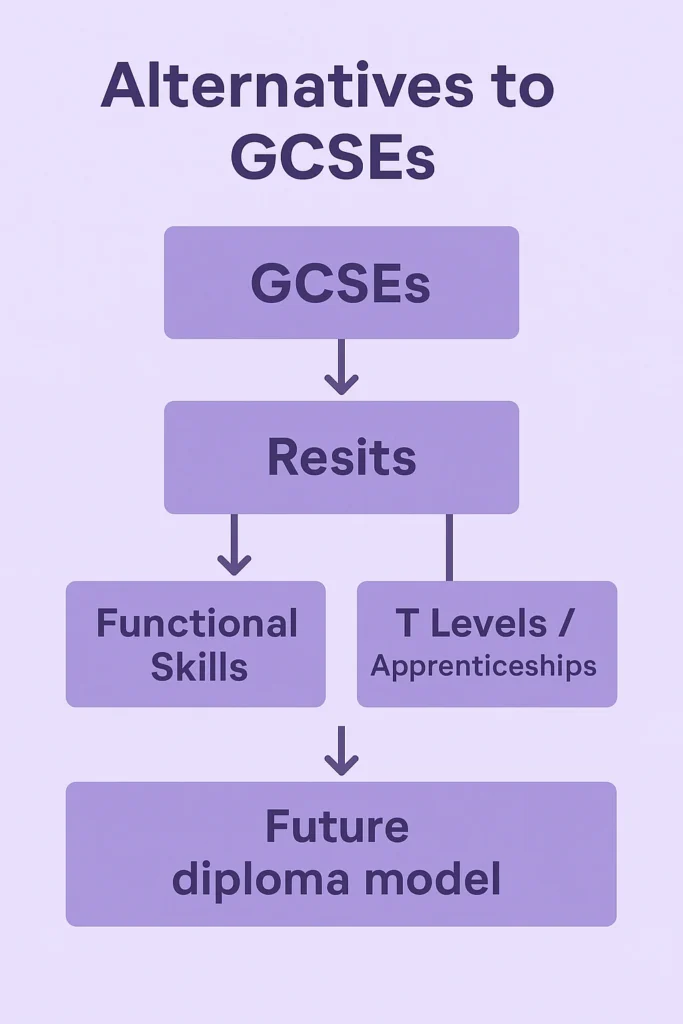
Some commentators argue that GCSEs should be replaced by a school‑leaving diploma or passport qualification that includes academic, vocational and life‑skills elements. Such a diploma could be completed over four years and assessed in multiple ways, reducing the reliance on final exams. The Cambridge Assessment roundtable even floated the idea of ending Key Stage tests and GCSEs at 16, replacing them with a more personalised programme.
However, supporters of GCSEs caution against radical change. They note that employers, colleges and universities understand the existing qualification and use it for admissions. Replacing GCSEs would require a huge cultural shift and might create confusion or reduce comparability. As a result, any major change is likely to be incremental, preserving the benefits of exams while addressing their shortcomings.
Alternative Proposals and Public Debate
Criticisms of the current system
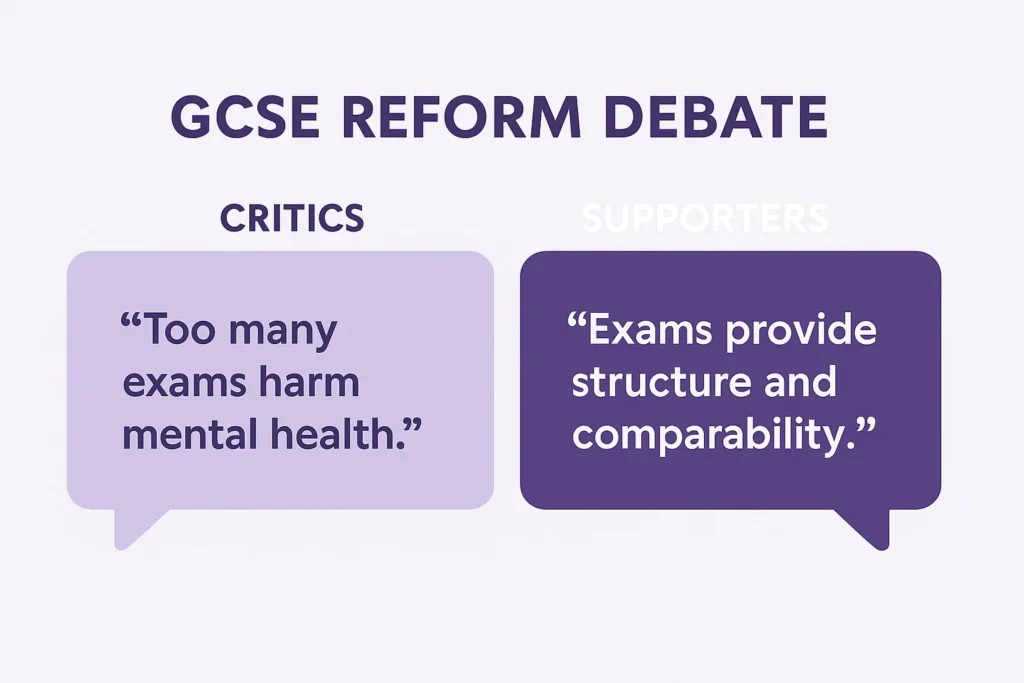
Beyond the technical reforms, there is a lively national debate about whether GCSEs should exist at all. Critics argue that the qualification creates a “cult of exams” where teenagers are judged on a narrow set of skills. Among the points raised:
- Academic mismatch. Critics say GCSE content is sometimes pitched above age level, with large amounts of information crammed into a two‑year course.
- League tables and competition. School performance tables encourage teaching to the test and penalise teachers who innovate or prioritise students’ wellbeing.
- Resits vs support. Mandatory resits for English and maths can feel like punishment for students who already struggle. Supporters say resits reinforce essential skills; detractors argue they distract from broader learning and can demotivate students.
- Inequity and private tutoring. Wealthier families can invest in tutors, while those from lower‑income backgrounds cannot. This intensifies a perceived two‑tier system and fosters resentment.
Proposals for change
Responding to these criticisms, various organisations and thinkers have proposed alternatives:
- Two‑phase education system. As mentioned above, one model envisages a general education until age 14, followed by a four‑year personalised programme combining academic and vocational elements. Exams would be replaced with coursework, projects and assessments aligned with students’ chosen pathways.
- Broadening pathways. Cambridge Assessment’s roundtable suggested that recognition at age 16 remains important but that GCSEs cannot be all things to all people. They recommended establishing practical routes, reducing emphasis on league tables and ensuring employers value basic literacy and numeracy.
- Student-led suggestions. Students want fairness and challenge. Ideas include modular exams, reducing course content, using a single exam board to standardise quality, and ensuring mark schemes test application rather than regurgitation. Some call for norm‑referenced grading (ranking candidates) rather than criterion‑referenced grading.
- Diploma or passport qualification. Advocates of this approach propose a single credential that records academic grades, skills achievements, work experience and personal projects. It would be recognised by colleges and employers and encourage a more holistic view of a young person’s abilities.
Arguments for retention and incremental reform
Not everyone wants to overhaul GCSEs. Proponents point out that exams:
- Provide motivation and structure, helping students develop resilience and time‑management skills.
- Offer a consistent, nationally recognised benchmark that employers and universities understand and trust.
- Ensure accountability and comparability across schools, supporting public confidence in the education system.
For these reasons, it’s likely that any reform will seek to preserve the core purpose of GCSEs while modernising the way learning is assessed and recognised.
Are GCSE Resits Mandatory?
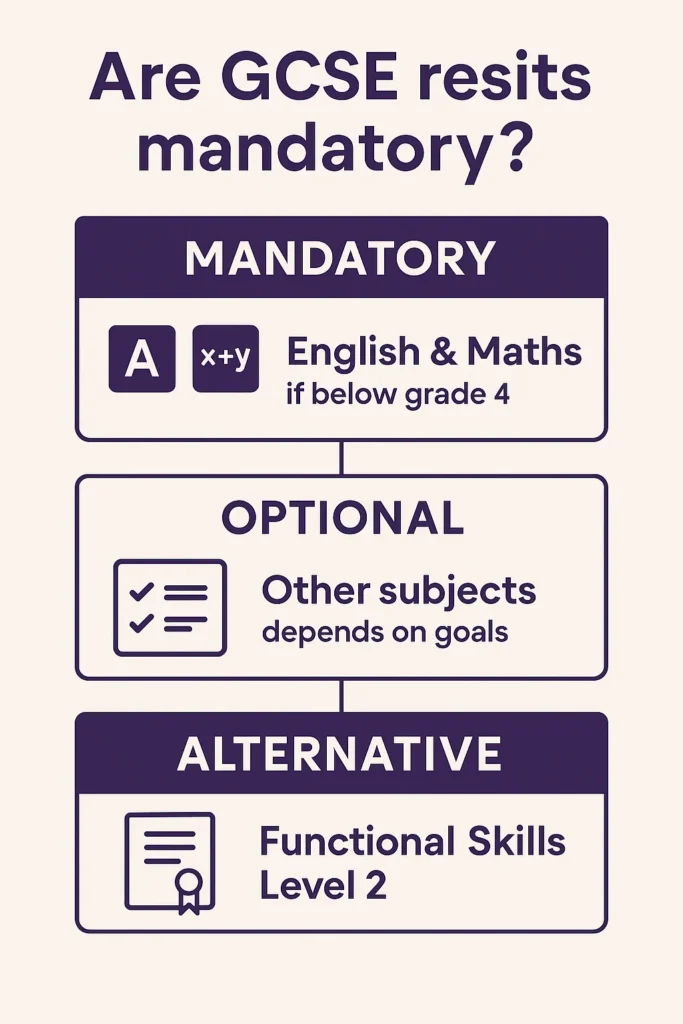
Under current regulations in England, students who fail to achieve a grade 4 or higher in GCSE English language or GCSE maths must continue to study these subjects and resit the exams until they achieve a pass. This requirement applies to students aged 16–18 in full‑time education, including those studying vocational qualifications. The rationale is that literacy and numeracy are foundational skills needed for further education, employment and everyday life.
Resits for other subjects are optional. Pupils may choose to retake a subject to improve their grade for sixth‑form entry or university applications. For example, competitive sixth‑form colleges sometimes require grades 6 or 7 in certain subjects. A better grade could also affect apprenticeship eligibility or provide more UCAS points for university applications.
Alternatives to mandatory resits
- Functional Skills qualifications. Students who struggle with GCSE English or maths may instead take Functional Skills Level 2 qualifications. These cover practical numeracy and literacy and are accepted by many employers and colleges. They are assessed through shorter tests and coursework and can be studied alongside vocational courses.
- Entry Level Certificates and free‑standing mathematics qualifications provide stepping‑stones to GCSE for learners with special educational needs or who are new to English.
- T Levels and apprenticeships require at least grade 4 in English and maths, so some students who do not pass may focus on retaking only those subjects while starting a vocational course.
If future reforms introduce a diploma or passport qualification, it may incorporate a literacy and numeracy component, reducing the need for repeated resits. For now, though, GCSE English and maths resits remain compulsory for those who don’t meet the grade.
What Do These Changes Mean for Students and Parents?
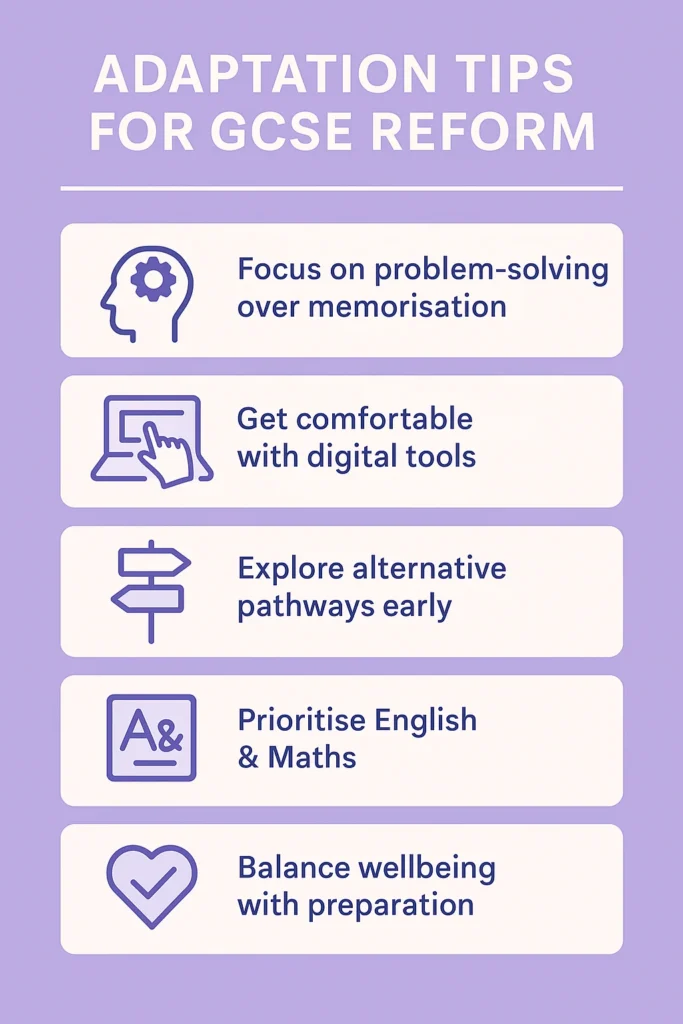
Less rote learning, more problem‑solving
The extension of formula and equation sheets and the emphasis on varied assessment methods signal a shift away from rote memorisation. Teachers and tutors will encourage students to develop problem‑solving abilities, critical reasoning and applied knowledge. Parents can support this by asking open‑ended questions about homework and encouraging real‑world applications of maths and science (e.g. budgeting, cooking, home experiments).
Increased digital readiness
As digital exams become more common, students must be comfortable using computers under timed conditions. Families should ensure access to reliable devices and internet and practise using digital tools. Schools should provide training and digital mock exams to familiarise learners with onscreen environments.
More pathways to success
The curriculum review may lead to more flexible pathways, allowing students to mix academic subjects with technical, creative or vocational options. Parents should stay informed about emerging programmes like T Levels, apprenticeships and combined academic‑vocational courses and discuss them with career advisers. Consider the student’s interests, preferred learning styles and career aspirations when selecting courses.
Ongoing importance of English and maths
Regardless of reforms, achieving at least a grade 4–5 in English and maths will remain crucial. Students who find these subjects difficult should seek support early, through school intervention programmes, online resources, study groups or tutoring. Foundation tier papers are designed to be accessible while still offering strong pass opportunities.
Mental health and wellbeing
Parents and teachers should be aware of the emotional toll of exam preparation. Encourage balanced routines, including sleep, exercise, hobbies and social time. Schools increasingly offer wellbeing programmes; students should make use of pastoral support and communicate if they feel overwhelmed. Resilience is important, but so is preventing burnout.
How RS Remote Tutoring Supports Students Through Reform
Understand an evolving exam landscape can be difficult. RS Remote Tutoring has helped hundreds of students perform well in GCSEs and other qualifications, and we are adapting our methods to support learners through the latest reforms. Here’s what sets us apart:
- Expert, qualified tutors. All our tutors are UK‑qualified teachers with up‑to‑date subject knowledge and familiarity with the latest curriculum and exam changes. They tailor lessons to each student’s ability and learning style, whether the focus is conceptual understanding, exam techniques or bridging knowledge gaps.
- One‑to‑one live sessions. Sessions are delivered via video call, allowing students to ask questions and work through problems in real time. Our tutors use interactive whiteboards to model solutions, annotate text and share resources. Lessons can be scheduled flexibly around school and extracurricular commitments, making them ideal for busy families.
- Recorded lessons for revision. With consent, each session is recorded. Students can replay explanations, pause to make notes and review tricky concepts at their own pace. This is particularly helpful close to exams or for retakes.
- Homework, feedback and progression tracking. Tutors assign tailored homework, mark it promptly and provide detailed feedback. Progress is tracked over time, so students and parents can see improvements and identify areas needing more focus. This approach builds confidence and independence.
- Support across subjects. We offer tutoring in core GCSE subjects such as English language and literature, mathematics, combined and separate sciences, history, geography, languages and business studies. We also provide study‑skills coaching to develop revision strategies, time management and exam technique.
If your child is preparing for GCSEs amid these reforms and you want expert guidance tailored to their needs, contact us at RS Remote Tutoring. Visit our website (rsremotetutoring.co.uk) to book a free consultation. Our team will discuss your goals, assess your child’s current level and create a personalised learning plan to help them thrive, whether they’re facing formula sheets, navigating digital exams or planning resits.
FAQs About GCSE Reform
Below we answer some of the most common questions parents and students have about the GCSE reform process. If you’re wondering about something not covered here, feel free to reach out to our tutoring team.
What is the main focus of the latest GCSE reforms?
The latest reforms focus on supporting learners after the pandemic (by extending formula sheets), trialling digital exams and reviewing the curriculum and assessment methods to ensure they prepare students for modern life. They also aim to reduce the need for rote memorisation and to promote problem‑solving skills.
What changes to GCSE exams are planned between 2025 and 2027?
1. Formula and equation sheets will continue for maths, physics and combined science until at least 2027, meaning students don’t need to memorise formulae.
2. Digital exams are being piloted, with some subjects likely available onscreen by 2027 and more by 2030.
3. The curriculum and assessment review may recommend a blend of traditional exams with coursework, projects and oral presentations.
4. Discussions about a school‑leaving diploma continue, but there is no concrete plan to replace GCSEs yet.
Is GCSE resit must for all subjects?
Resits are mandatory only for GCSE English language and maths if a student does not achieve a grade 4. For other subjects, resits are optional and depend on individual goals (e.g. raising grades for sixth form or university). Some students may choose functional skills qualifications instead of repeated GCSE resits.
Will GCSEs be scrapped entirely?
There is no official plan to abolish GCSEs, though some prominent voices advocate for their replacement. The national review may propose changes to content and assessment methods, but exams are likely to remain an important part of the system for the foreseeable future.
How do I prepare for digital GCSEs?
Practise using computer‑based platforms for writing and problem‑solving. Sit digital mock exams if your school offers them. Familiarise yourself with onscreen tools such as highlighting, zoom and navigation. At the same time, keep practising pen‑and‑paper techniques because paper exams will continue in parallel for some years.
Are grade boundaries going to change?
Grade boundaries change slightly each year depending on exam difficulty and cohort performance. For the new 9–1 system, exam boards set grade boundaries after marking is complete. Boundaries may shift again as digital exams and new assessment methods are introduced, but regulators will monitor fairness and comparability across years.
Are there regional differences in GCSE reforms?
Yes. Education is a devolved matter in the UK. While England uses the 9–1 grading system and is trialling digital GCSEs, Wales still uses A*–G for many subjects, and Northern Ireland has the A*–G scale with an extra C* grade. These nations may adopt different timelines for reforms.
Will practical subjects change under GCSE reform?
Practical subjects like art, design technology and music currently include non‑examined assessments (NEA). Future reforms may increase the NEA component and emphasise portfolios, projects and performances. Students should continue to develop practical skills and document their creative processes.
Conclusion
GCSEs sit at the heart of England’s secondary education system, but they are facing pressure to adapt to a changing world. Reforms already introduced have made qualifications more rigorous but also more stressful. Now, the next wave of changes, extending formula and equation sheets, piloting digital exams and reviewing the curriculum – aims to make assessments fairer, more modern and better aligned with learners’ needs.
While some stakeholders advocate for scrapping GCSEs altogether, others caution that exams provide structure and comparability. The most likely outcome is incremental change: preserving the core purpose of GCSEs while introducing alternative pathways, varied assessment methods and greater support for students who struggle. Whether you are a student, parent, teacher or employer, staying informed about these reforms will help you prepare and make the most of whatever system emerges.
Remember, success in GCSEs, reformed or not, it is still hinges on mastering English and maths, developing broad knowledge, practising exam technique and looking after your wellbeing. With the right support and preparation, every student can thrive amid change.
Disclaimer: This guide is for informational purposes only, please refer to official exam board or Gov.uk updates for the latest details.

Raja specializes in Physics and Maths, with over 5 years of experience. He offers KS2, KS3, and GCSE Science and Maths lessons. He graduated from one of the top universities in the UK.

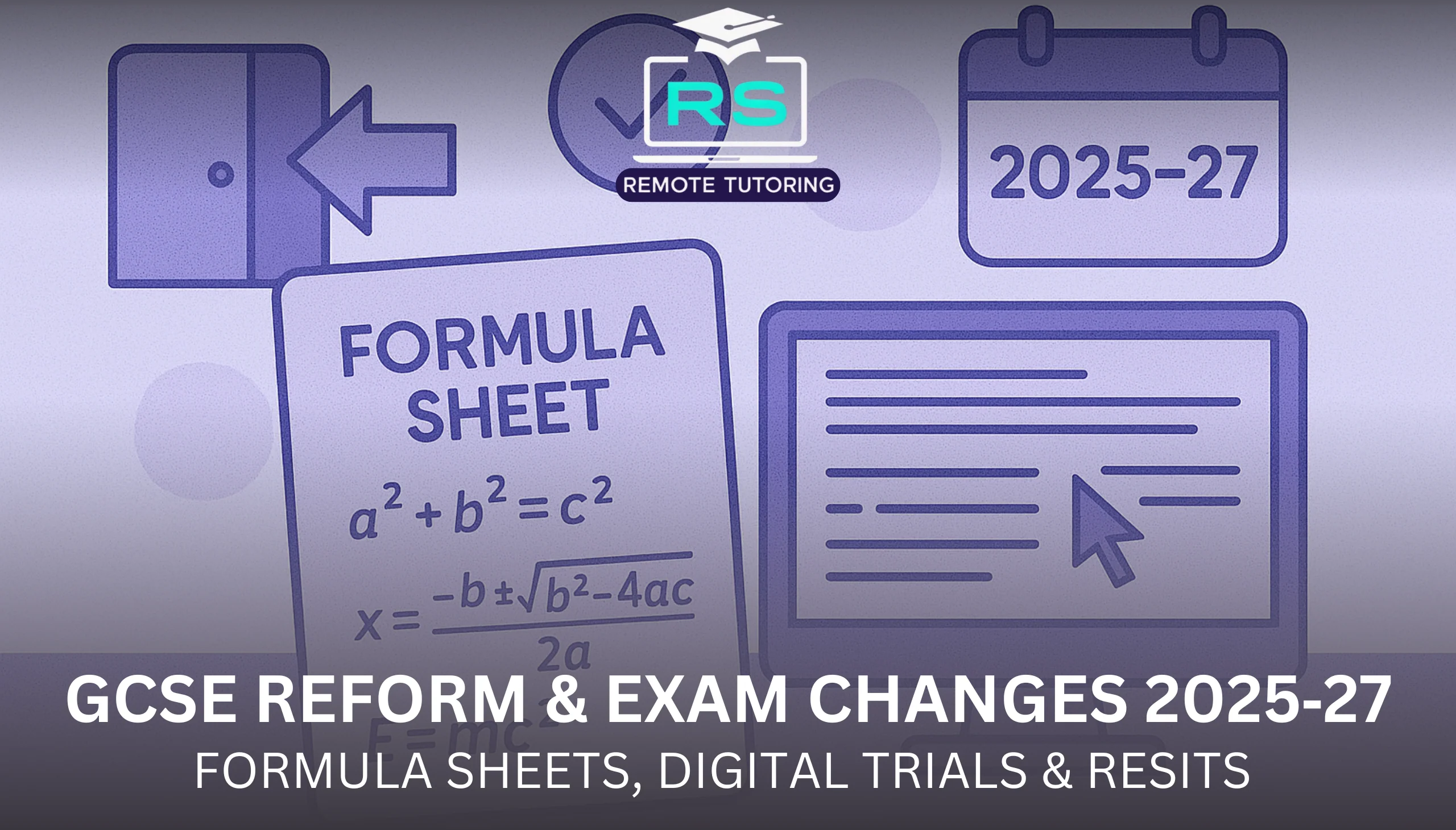
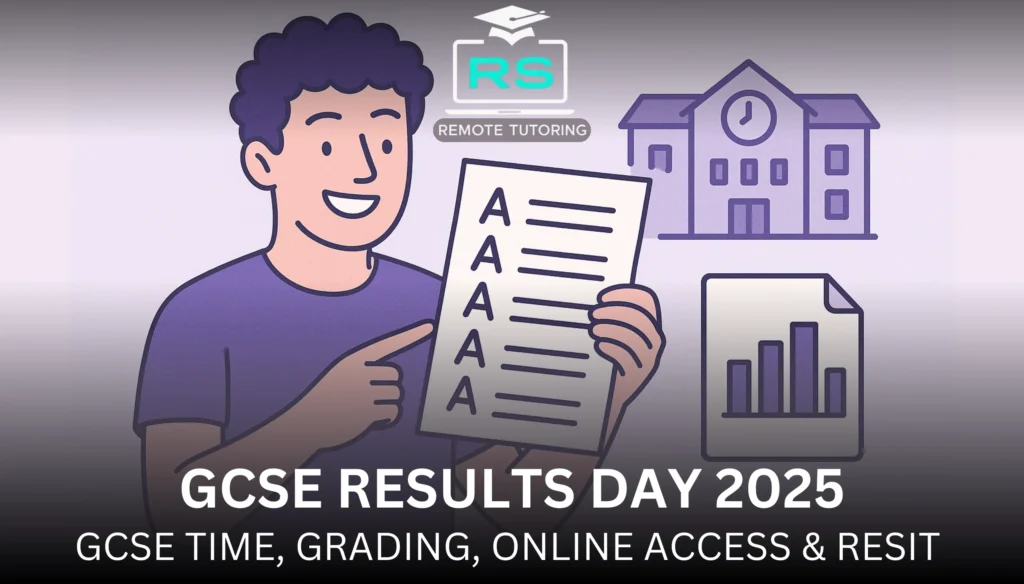
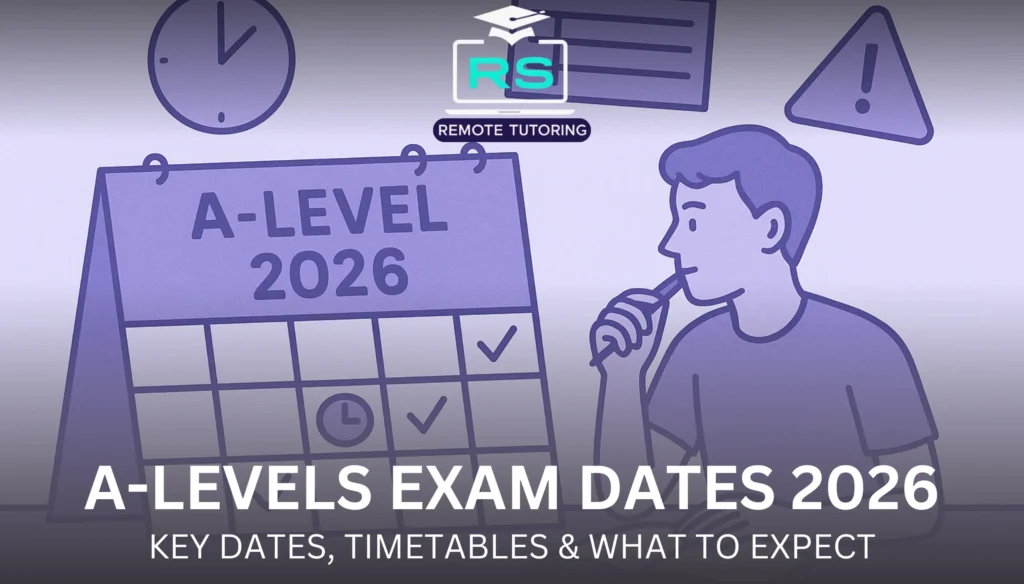
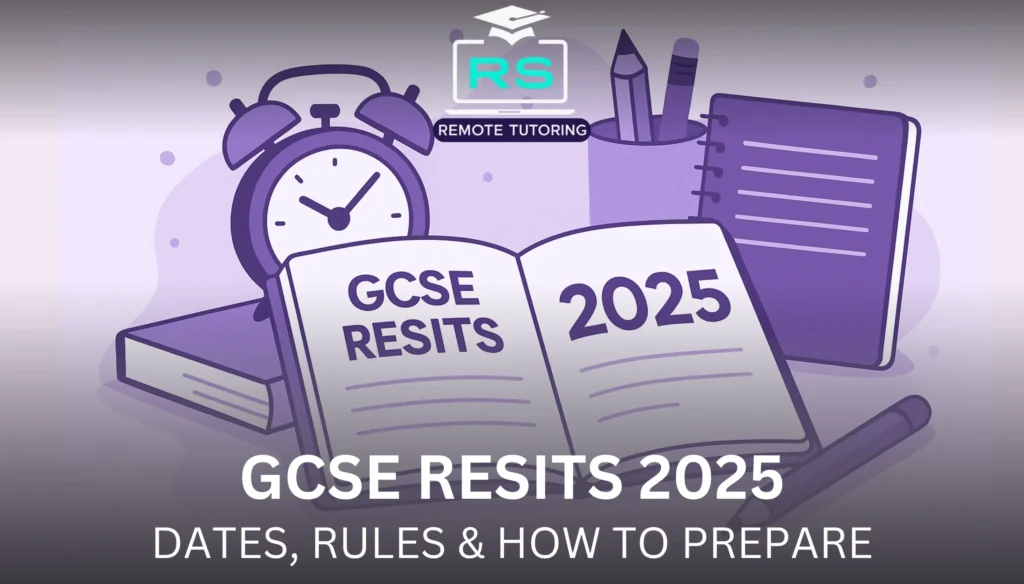
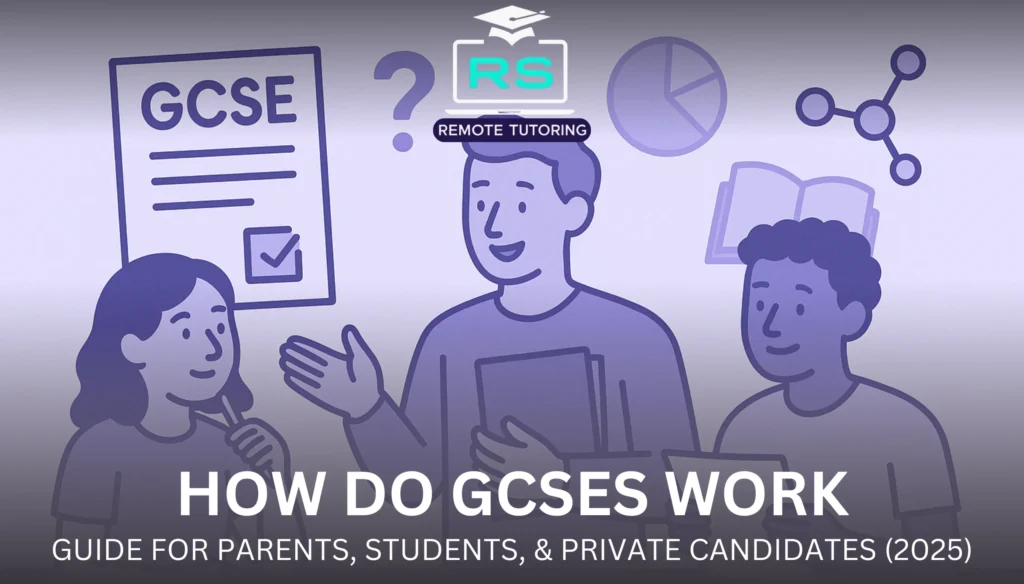
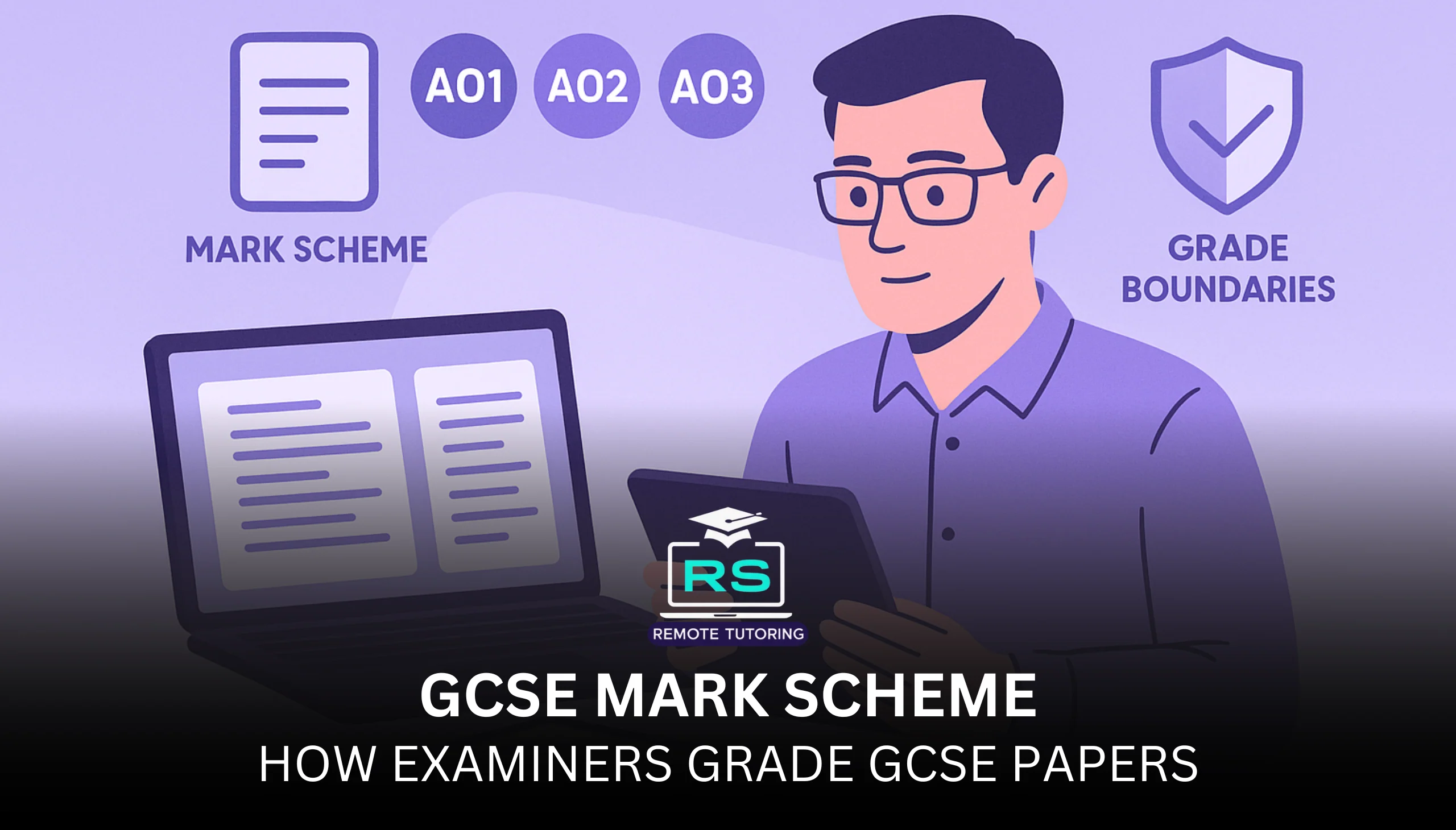
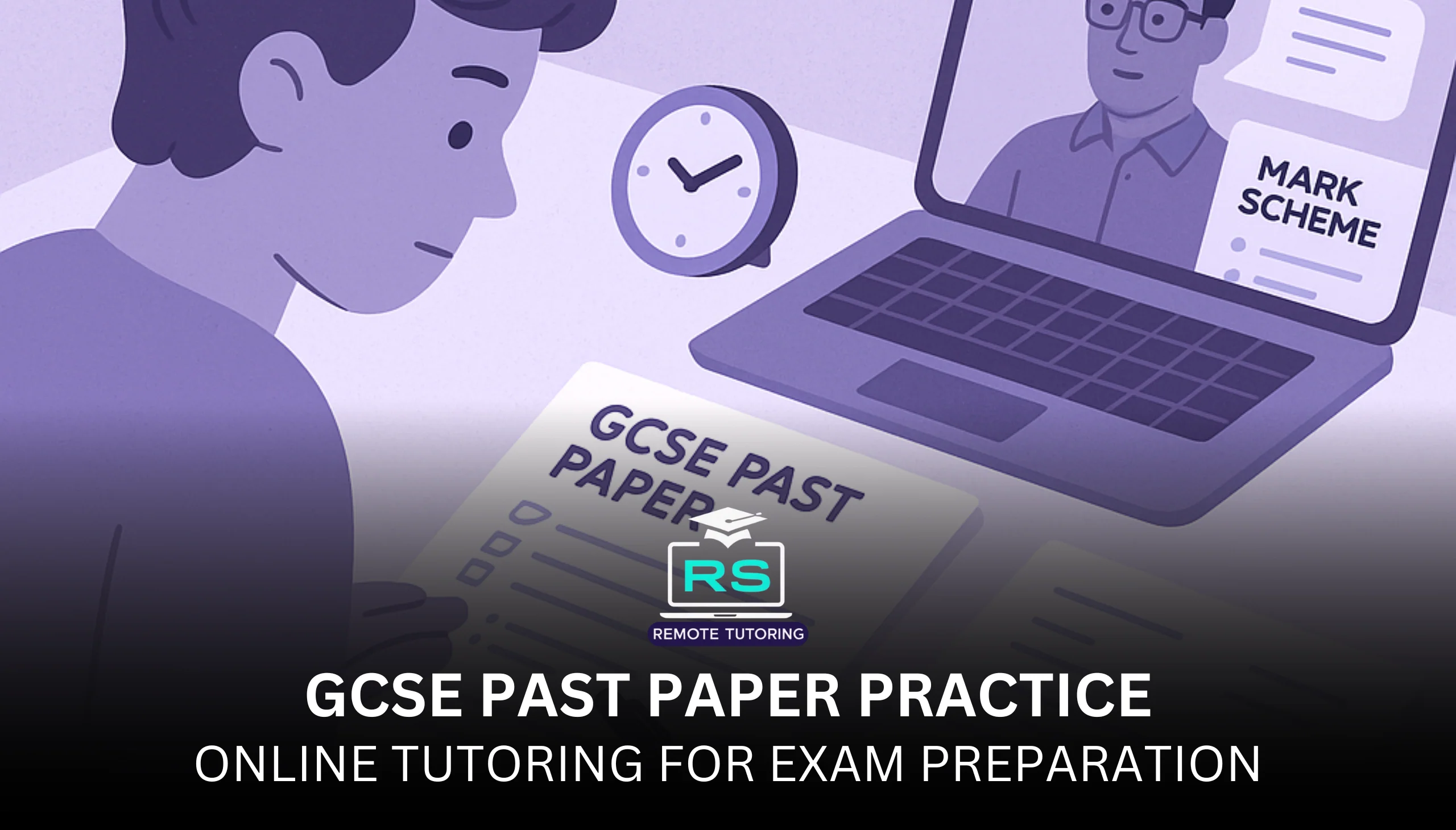


4 Comments
[…] exam timetables are organised, what to expect in different subjects, entry deadlines, results day, GCSE reforms that will affect exam formats and how to prepare effectively. Whether you’re a pupil, a parent or […]
[…] gaps due to reform: With ongoing GCSE reforms (e.g., formula sheets for maths and science, digital exams under trial), students may need guidance […]
[…] Alert: With reform in motion, resit arrangements may shift. Read our GCSE Reform & Exam Changes 2025-27 guide to understand how formula sheets, assessment changes, and resit policies are […]
[…] extended formula sheets, digital exam pilots, and broader curriculum review. Check out our GCSE Reform & Exam Changes 2025-27 […]